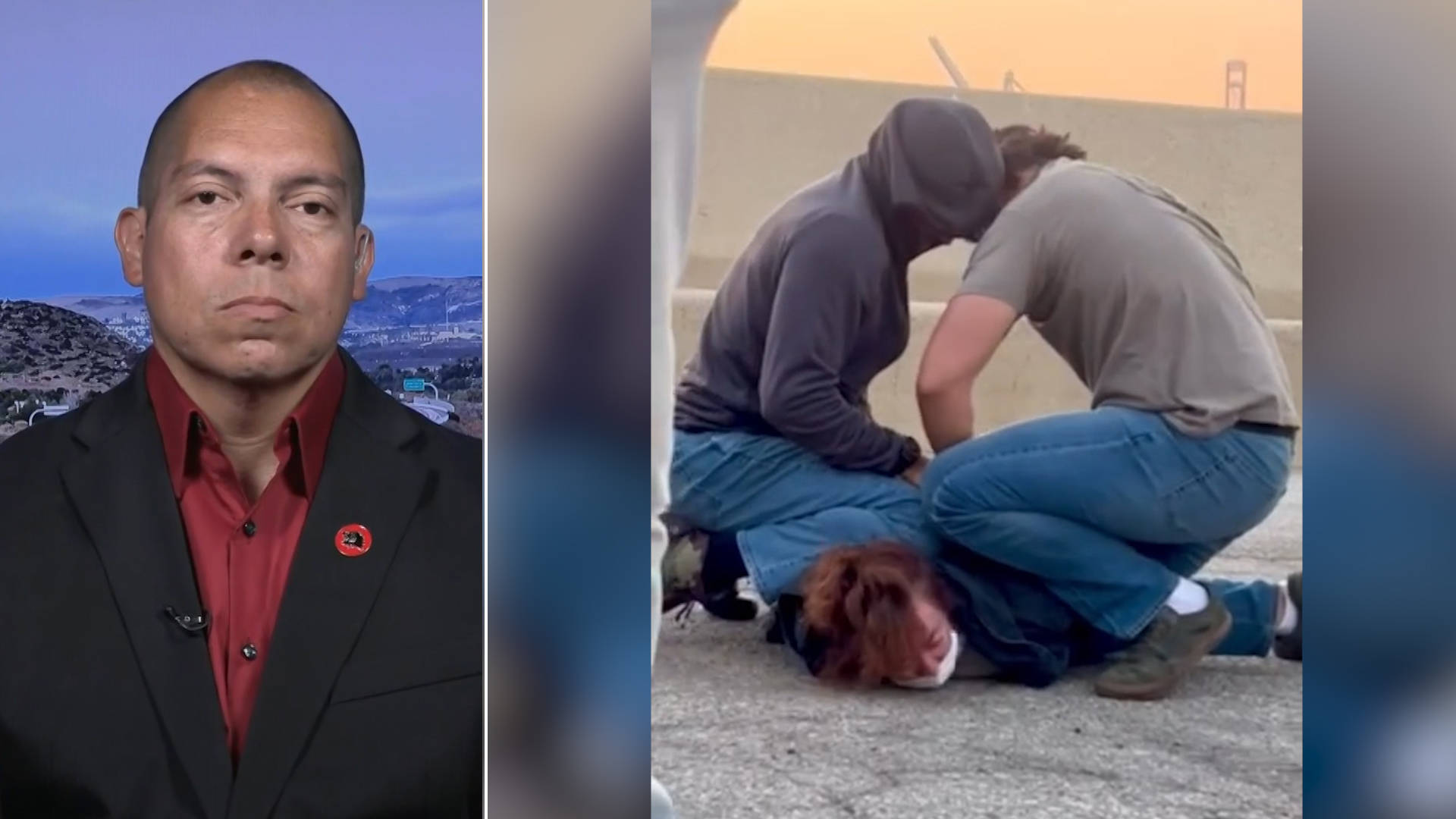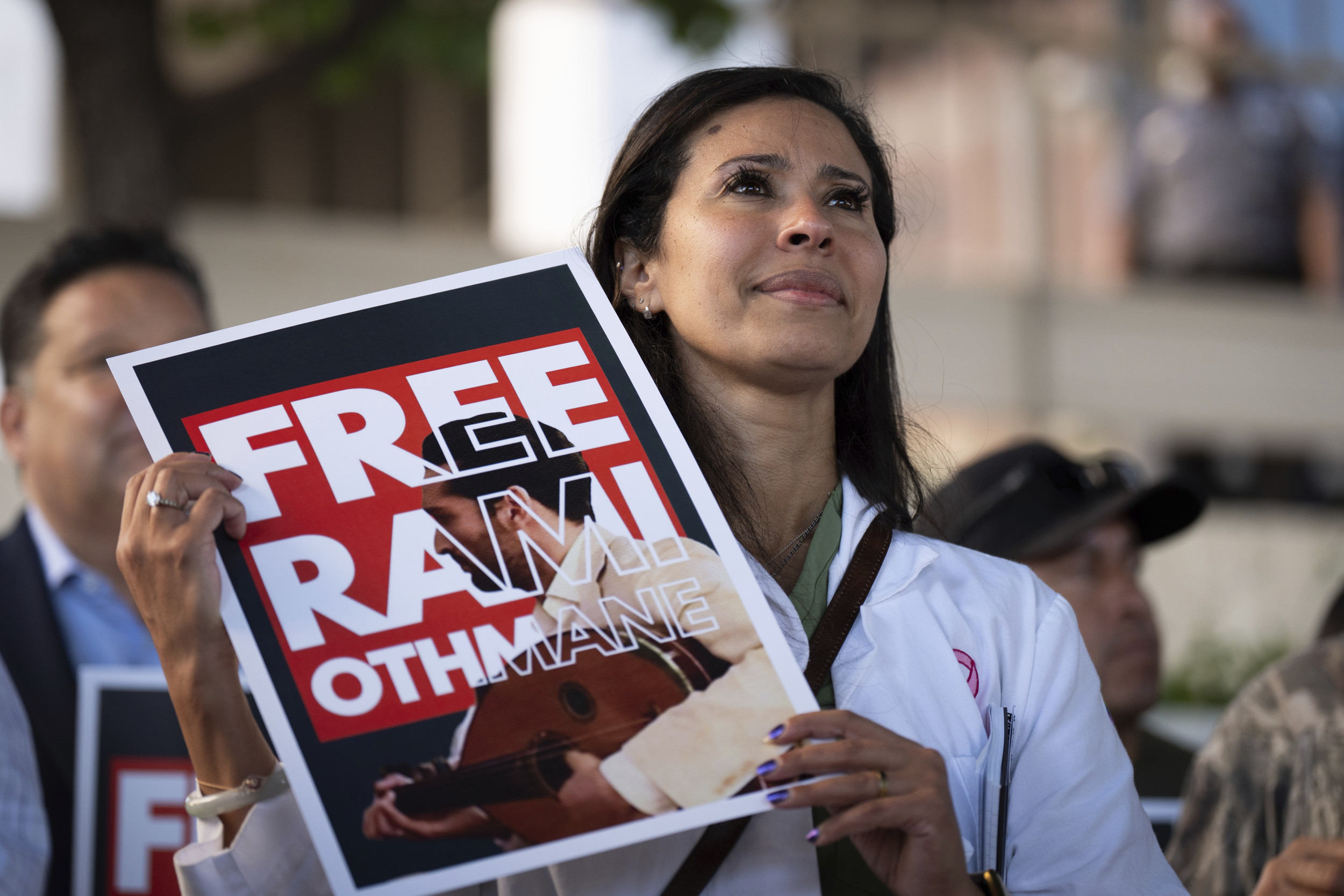From her room on the third floor of the Sonesta Chicago O’Hare Airport Rosemont hotel, Valentina Galvis could see flight crews and travelers coming and going. Families enjoyed summer dining on the outdoor patio. Friends snapped selfies commemorating their stays. Children fidgeted as they waited for shuttles to deliver them to the nearby airport.
But for Galvis and her seven-month-old son, the hotel was not a vacation — it was a jail. The phone had been removed from the room, and Galvis had no way to contact the outside world. Private guards contracted by U.S. Immigration and Customs Enforcement stood watch at all times. She had no idea when she and her son Naythan, who is a U.S. citizen, would ever get to leave.
Galvis and her son were detained at the Sonesta for five days in early June after they were apprehended at the Chicago Immigration Court by federal agents.
“I was sad, confused, and often terrified,” Galvis said. “I wanted to call my husband, my attorney, or anyone at all to let them know where I was.”
In screenshots taken by family members and reviewed by Injustice Watch and The Intercept, Galvis appeared on the ICE locator to be held over 700 miles away in Washington, D.C.
Galvis’s detention at the airport hotel came as federal immigration authorities have rounded up more than 100,000 immigrants nationwide in an effort to meet arrest targets set out by the Trump administration. The spike in immigration arrests has overwhelmed detention centers around the country: Immigrants have been packed into overcrowded holding cells, forced to sleep on floors, and subjected to “unlivable” conditions at a hastily built detention camp in the Florida Everglades.
Though a hotel may seem preferable to these conditions, advocates said Galvis’s detention raises concerns about what types of facilities are being turned into de facto detention centers and how many people are quietly held in Illinois.
Xanat Sobrevilla, who works with Organized Communities Against Deportations, says it’s not the first time she’s heard of an Illinois mother of an infant baby appearing to be in Washington, D.C. — which has no detention center.
“We know we can’t trust the ICE detainee locator,” she said. “People get lost in this system.”
Rep. Delia Ramirez, D-Ill., called the false location listing “chilling” and likened the secretive hotel detention to a “kidnapping.”
Illinois and Chicago have some of the nation’s strongest laws aimed at protecting immigrants like Galvis by prohibiting state and local agencies from cooperating with ICE. But her and Naythan’s detention at the Sonesta shows the limits of the state’s efforts to block ICE detention. The federal government can still use commercial facilities like hotel rooms to hold individuals and families in its custody.
“Nothing that the states or local governments can do will stop ICE from carrying out its operations,” said Fred Tsao, senior policy counsel at Illinois Coalition for Immigrant and Refugee Rights.
Illinois Gov. JB Pritzker, who has backed legislation that defends immigrants in the state, declined to comment.
Ramirez said private companies are violating the spirit of sanctuary legislation — and she called for a state investigation into what happened with Galvis.
“This requires the [Illinois] attorney general to conduct an investigation and to consider what legal action must be taken in the state of Illinois” against the security company that detained Galvis and Naythan as well as the hotel they were confined in, Ramirez said.
Illinois Attorney General Kwame Raoul’s office did not respond to requests for comment.
In a statement to Injustice Watch, Sonesta, one of the world’s largest hotel chains, asserted it “has no knowledge of any illegal detentions at any hotels in the Sonesta portfolio.”
Immigration and Customs Enforcement did not respond to requests for comment.
ICE Detention by Another Name
Galvis doesn’t remember the name of the company the civilian guards said they worked for. But she recognized a photo of JoAnna Granado, an employee for MVM Inc., a longtime ICE contractor with active contracts to transport children and families and a track record of confining unaccompanied migrant children in office buildings as well as in hotels. Granado confirmed to Injustice Watch and The Intercept that she transported Galvis and her son from the Sonesta O’Hare. MVM did not respond to numerous requests for comment.
Since fiscal year 2020, MVM has entered into contracts worth more than $1.3 billion from ICE — the vast majority of it for the transportation of immigrant children and families.
In 2020, when an attorney for the Texas Civil Rights Project attempted to reach unaccompanied children being held in a McAllen hotel, he was physically turned away. ICE acknowledged MVM was at the hotel in question. The Texas Civil Rights Project and the American Civil Liberties Union sued the Trump administration, and the government ultimately transferred the children out of the hotel.
More recently, attorneys filed suit against MVM last year for enforced disappearance, torture, and child abduction — among other claims — for its role during the first Trump administration’s zero-tolerance policy that separated thousands of children from their parents near the border. The company’s effort to get the case dismissed failed.
Calls to the Sonesta O’Hare in June and July after Galvis’s release confirmed that MVM had rooms there.
ICE’s standards for temporary housing allow for the use of hotel suites to hold noncitizens “due to exigent circumstances including travel delays, lack of other bedspace, delay of receipt of travel documents, medical issues, or other unforeseen circumstances.” The standards require ICE or its contractors to explain to the detainee why they are at the hotel and how long they will be there, and to inform the detainee of the right to file a grievance, as well as “unlimited availability of unmonitored telephone calls to family, friends, and legal representatives” and various oversight agencies. Galvis said she wasn’t allowed to make any calls and was never told she was able to file a complaint.
In its statement, Sonesta said that “all guest rooms at the property have a telephone and seating” at the O’Hare hotel.
Two Sonesta O’Hare workers said they were familiar with MVM — one added that the company had a special rate there. (In a phone call with Injustice Watch, Sonesta O’Hare’s general manager, Sandra Wolf, said she was “unaware” of MVM or the confinement of detainees at her hotel.)
Calls to other airport Sonesta hotels suggest that MVM’s detention of immigrants may be more widespread.
When called in June, a front-desk worker at the Sonesta Atlanta Airport South in Georgia said that MVM usually has rooms at the hotel. On a call, an attendant at the Sonesta Select Los Angeles LAX El Segundo immediately recognized the company name and explained that MVM books rooms at a nearby property.
A front-desk agent at the nearby Sonesta Los Angeles Airport LAX acknowledged by phone that MVM regularly has rooms at the hotel. The hotel’s general manager Robert Routh later said he’d never heard of MVM and wasn’t familiar with the practice of holding ICE detainees in his hotel.
In a written statement, Sonesta wrote that it “does not condone illegal behavior of any kind at its hotels, and we endeavor to comply with the law and with law enforcement in the event of any suspected illegal behavior at any property within the Sonesta portfolio.” The company declined to answer questions about whether it has any contractual obligations to MVM or whether MVM received a special rate at its hotels.
Snatched From Immigration Court
Galvis knew before she went to Chicago’s immigration court on Thursday, June 5, from news and social media reports that ICE had been arresting people like her when they had shown up to court for their immigration cases.
But her husband, Camilo, a long-haul truck driver, had been granted asylum in the same court just two weeks earlier. The facts of their cases were almost identical. They had come to the U.S. together in 2022, fleeing far-right paramilitary violence in their native Colombia. Galvis had also survived a brutal assault from the paramilitary group.
So she came to the court at 55 E. Monroe Street with her infant son, Naythan, hoping to walk out without incident.
Instead, as with thousands of other immigrants in recent months, federal prosecutors asked the judge to dismiss her case, ending the asylum process. Plainclothes agents were waiting to detain her the moment she left the courtroom.
The agents shuttled Galvis and Naythan first to a nearby building, where she was fingerprinted and her phone and documents — including Naythan’s U.S. passport and birth certificate — were seized. Mother and son were then taken to an initial hotel where they spent several hours late into Thursday night. She was told that they would be flown to Texas before dawn on Friday — the sole detention center, ICE claimed, that could accommodate families. She was allowed one call to her husband; in a call that lasted a few seconds, she told him she was heading to Texas.
The terror that Naythan might be torn away consumed her thoughts. She could endure detention and deportation alongside her son, Galvis said. Without him, she believed grief alone might kill her.
Around 2:30 a.m., two people dressed in civilian clothing arrived. They said their names were Alejandro and Lori and told Galvis in Spanish that they worked for a private company, though Galvis doesn’t remember which one. They encouraged her to ask any questions about her case to the ICE agents while she still had the chance, because the two of them wouldn’t be able to answer them.
Soon after, they brought Galvis and Naythan to the Sonesta, where they would spend the next five days cut off from the outside world.
They were held in a two-room suite and monitored at all times by one or two civilian guards, sometimes Alejandro and Lori and sometimes others. They were given fast food: Panera Bread, Subway, McDonald’s; Galvis picked out little pieces of vegetables to feed to her son, who was just beginning to eat solid foods.
On Friday, the day after she and Naythan were detained by ICE, Galvis’s attorney William G. McLean III filed a writ of habeas corpus, petitioning for her release. U.S. District Judge Franklin Valderrama soon ordered that the Trump administration “shall not remove Petitioners from the jurisdiction of the United States, nor shall they transfer petitioners to any judicial district outside the State of Illinois” before June 12. Judge Valderrama set an afternoon hearing for Tuesday, June 10, on the matter.
In emails reviewed by Injustice Watch and The Intercept, McLean pleaded with an ICE field officer for days to know his client’s whereabouts. “We do not know where they are located,” he wrote on Saturday. “I feel that it is very important to know that everything is OK,” he wrote the following Monday. ICE didn’t reveal his client’s location.
Galvis, meanwhile, had no idea about her lawyer’s efforts to release her. One day, she was told by one of the civilian guards that she would be deported with her son to Colombia. Other days, she said, she was told they’d be taken to Texas. She continued to fear that her son would be taken from her.
Finally, on the fifth day, Granado and another guard loaded Galvis and Naythan in a car but wouldn’t divulge where they were headed, Galvis said. While the airport was only minutes away, she noticed the navigation system indicated a 40-minute drive. Her heart sank, thinking they were taking her to a new location where her son could be taken from her.
Galvis kept quiet in the car, caressing Naythan and silently praying. As they approached their destination, Granado turned to her, Galvis said.
“I think they’re going to let you go,” Galvis remembered her saying.
Galvis didn’t believe her. But moments later, she was at the Department of Homeland Security’s Intensive Supervision Appearance Program office in Chicago. Agents gave her paperwork, including some of Naythan’s documents, and placed an electronic bracelet monitor on her wrist. Relief overcame her, mixed with uncertainty about what could happen next.
“I was obviously very scared of being deported, but my principal fear was being deported without my baby,” Galvis said. “I don’t think I could have survived that.”
The dismissal in Galvis’s original immigration case is on appeal, and she now has a new asylum case with a new immigration judge in the same court. Galvis has regular online and in-person check-ins. Her next immigration court date is scheduled for January.








